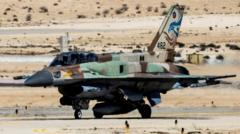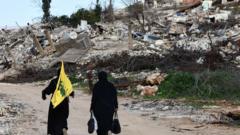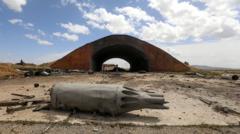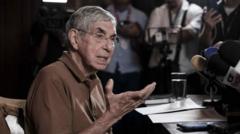As Israel conducts multiple air strikes against Syrian military installations, it faces heightened confrontations with Turkey, which is negotiating a defense pact with Syria's interim government. The conflict signals a turbulent phase in Syria's recovery, complicating the internal and external dynamics as regional powers vie for influence post-Assad.
Rising Tensions: Israel and Turkey Clash Over Influence in Post-Assad Syria

Rising Tensions: Israel and Turkey Clash Over Influence in Post-Assad Syria
Israel intensifies air strikes in Syria, targeting military sites amid escalating tensions with Turkey, which seeks to solidify its presence in the region.
The confrontation between Israel and Turkey is intensifying against the backdrop of a fragile new government in Syria. On Wednesday night, Israel launched a series of air strikes on several military targets within Syria, specifically targeting Hama military airport and T4 base near Homs. Reports indicated that the attacks caused significant damage to the Hama base, with the Syrian foreign ministry claiming it was “virtually destroyed.” According to a Syrian human rights organization, the strikes resulted in the death of four defense ministry personnel and injuries to others.
While the air strikes were primarily aimed at Syrian military facilities, analysts suggest that the underlying message was directed at Turkey. Following the attacks, Israel's foreign minister criticized Turkey’s involvement in Syria and stated that the interim president, Ahmed al-Sharaa, would face severe consequences if he allowed any “hostile forces” to operate from within Syria. This comes as Turkey is reportedly negotiating a defense agreement with Sharaa’s administration and is considering the deployment of military equipment, including aircraft and air defense systems, at key Syrian bases.
Relations between Israel and Turkey have sharply deteriorated since the onset of the Gaza conflict in October 2023, with Turkey accusing Israel of genocide and implementing economic sanctions against it. In response to the recent air strikes, Turkey accused Israel of exacerbating regional instability and feeding terrorism. However, Turkish Foreign Minister Hakan Fidan expressed that Turkey is not looking for a confrontation with Israel and respects Syria’s autonomy in its foreign relations.
Sharaa’s administration, which took power after the ousting of President Bashar al-Assad, has signaled a desire to avoid direct conflict with Israel. He has previously expressed interest in future diplomatic relations with Israel and is focused on stabilizing Syria in the wake of previous unrest. However, Israel continues to intervene militarily, targeting arms depots and military sites to prevent enemy forces from gaining a foothold in Syria—a stance complicated by the presence of Turkish support for Sharaa's administration.
Israel's military operations have included regular incursions into southern Syrian provinces, as armed groups and remnants of past adversaries remain active. Following a recent Israeli bombardment in the southern city of Deraa that led to civilian casualties, local communities have begun to mobilize against Israeli forces, reflecting a shift in public sentiment toward Israel from some Syrians who previously hoped for improved relations post-Assad.
The ongoing conflict has revived sectarian tensions within Syria, a country already marred by years of internal strife and external interventions. The recent violence, particularly in coastal regions known for their Alawite support for the Assad regime, and the lingering influence of Iran complicate the situation further. Observers of the region caution that ongoing external pressures could plunge Syria back into chaos, undermining the efforts of Sharaa’s new government to unify a divided nation.
As tensions between Turkey and Israel mount over their respective interests in Syria, the risk remains high for renewed conflict among regional powers, illustrating the ongoing struggle for influence amid a precarious political landscape in Syria.



















